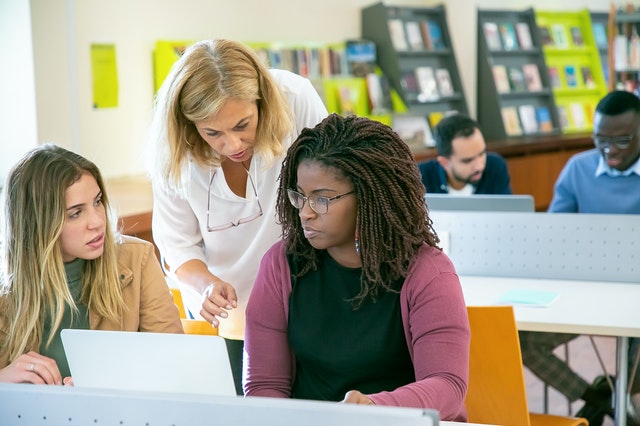Educator Knowledge of Reading Norming Study
A short overview of the study is provided in the flyer.
Educator Knowledge Norming Study Flyer

What is the project about?
We are researching what educators across North America know about reading and reading
instruction. To help us do so, we are developing a test that measures educators’ knowledge
of reading and reading instruction! We need your help to accomplish this because we
need educators who serve in different roles to complete our measure. We want to partner
with schools and districts to collaborate and to serve as sites for norming the measure!
What is included in the survey? (or what does the survey entail?)
The survey consists of three main components. At each site, each educator will complete
the survey on their own. The educators will
- Fill out simple background questions about their role in the school, level of education,
and prior training experiences.
- Rate their perceptions of their knowledge and ability to teach six domains of literacy
(phonological awareness, decoding, encoding, morphology, vocabulary, and reading comprehension).
- Complete the reading knowledge measure which consists of 60 questions about the six
domains of literacy previously listed. It includes questions about academic and pedagogical
knowledge of those domains.
What will your school/district need to do to be a study site?
- Provide us a list with emails and roles for a cross-section of educators (e.g., Teachers,
Instructional Coaches, School Psychologists, Administrators, etc.). Again, all information
is kept confidential!
- We will work with each site to customize some of the background items to best fit
your group.
What are the benefits?
For individual educators: Each individual receives an email summary of their results on the knowledge measure.
For sites (i.e., schools or districts): Each site will receive a report with an overall snapshot of their group’s perceptions
of knowledge and performance on the knowledge test. Sites can use this report to guide
staff development.

Frequently Asked Questions About the Project:
Do you only partner with public schools?
No! We work with all school types, including private schools and unique school settings.
We also work with individual schools or entire districts, depending on interest level
and what makes the most sense for your site.
Do you only want classroom teachers to complete the educator knowledge measure?
No! We want to work with educators in all roles, including, but not limited to, classroom
teachers, special educators, interventionists, instructional coaches, principals,
administrators, school psychologists/diagnosticians, paraprofessionals, ESL teachers,
and speech-language pathologists.
How long does the entire survey take?
The entire survey takes approximately 60 - 90 minutes to complete!
How many educators have to take the measure for my school/district to be able to participate?
We are open to working with schools/districts of various sizes.
Do I have to complete the entire survey in one sitting?
No! The survey can be completed all at once or over multiple sessions.
When can I administer the survey?
Many school districts elect to embed time to complete the survey into a professional
development day. Your individual school/site will decide how this survey best fits
into your school year and with your educators’ time.
How is the survey administered?
The survey is administered completely via an online, HIPAA compliant platform called
REDCap. Each educator will receive a personal link via email allowing them to access
the survey. Each educator will have the opportunity to choose to participate and provide
their informed consent.
What have people from participating sites shared about their experience being in the
study?
Return on Investment of Time
We use continuous improvement cycles at our school. The first step in the cycle is
to "Assess your status" and that's exactly what we were able to do at our school with
the teacher knowledge survey. Staff assessed their current understanding of the literacy
knowledge and practice. This valuable information gave me information in determining
our next action steps in the action plan for professional development and working
with our consultant in aligning the teaching and learning to the Science of Reading.
- Elementary principal in a rural community
Usefulness and Usability of the Summary Report
The teacher knowledge survey provided valuable information to help me determine how
to best build their capacity in teaching literacy. The report did confirm what I thought
and helped me to act in setting up trainings for the staff. I'm currently looking
into AIM institute, LETRS and Top Ten Tools to train the staff. - Elementary principal
in a rural community
Respect, Privacy, and Confidentiality
The staff were comfortable taking the survey knowing that their privacy and confidentiality
was protected. Staff was informed that their name would not be attached to the survey,
but that the collective results would be grouped together to determine professional
development needed to teach reading. Throughout the entire process through emails
and Zoom meetings I felt respected and supported in our journey to learn more reading.
- Elementary principal in a rural community
Comments on Process of Setup and Participation
The setup was very easy. The initial meeting helped me as the building leader learn
about the teacher knowledge survey, what domains it assessed and how to use it make
further decisions. Further collaboration emails was worked out through Zoom meetings
and emails. These meetings helped me to plan the survey with the school leadership
team first and then to be given to the staff. The participation process was easily
set up with staff receiving individual emails for the survey on a specific date that
was set up by me. - Elementary principal in a rural community
This project has been approved by the MTSU Institutional Review Board (IRB). The formal
protocol title is “Characterizing Educator Knowledge: A large sample of educators
in different roles.” The protocol id is 21-2052 7q. Principal investigators are Drs.
Emily Farris and Tim Odegard.
How can my school or site participate in this project? (How can I find out more about
my school or district becoming a norming site?)
Email Dr. Emily Farris at Emily.Farris@mtsu.edu for more information and to schedule an initial zoom session with representatives
from your potential site.




